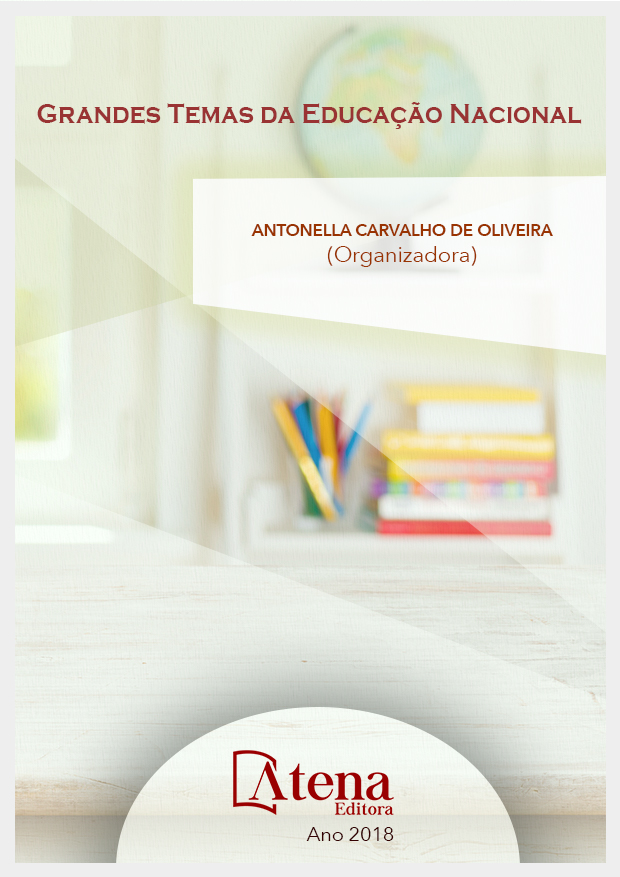
A ARTE NA EDUCAÇÃO INFANTIL: INSTRUMENTO DE DESENVOLVIMENTO HUMANO PSICO INTELECTUAL E EMOCIONAL NA INFÂNCIA.
Este trabalho tem como principio
fundamental teorizar atividades cognoscitivas
do processo de construção da práxis
docente vigorada durante o estagio curricular
supervisionado em educação infantil, dando
ênfase ao processo artístico como instrumento
indispensável no processo de construção
intelectual e humano da criança. A metodologia
utilizada neste estudo abrange, a pesquisa
bibliográfica vinculada a esta temática, a qual
evidencia que a arte é de suma importância
no desenvolvimento da criança, pois abrange
desde o desenvolvimento dos seus processos
de pensamento ao desenvolvimento perceptual
e emocional, para sua conscientização social
e para seu desenvolvimento criador. Pois, é
por meio do desenho, da pintura, dos jogos
dramáticos, que a criança seleciona aspectos
de sua experiência articulando-os e integrandoos num todo significativo. E a análise originária
dos relatórios finais do Estágio Curricular
Supervisionado em Educação Infantil, do
qual surgem os questionamentos frente ao
desenvolvimento da autonomia da criança,
ao seu processo como ser sensível e criador,
uma vez que a realidade instituída nos Centros
de Educação Infantil, são retardatárias a
estes processos. Quanto aos procedimentos
teóricos utilizados neste artigo, o mesmo da
ênfase a teoria Vygotskyana como instrumento
de significação da arte como instrumento
metodológico na construção intelectual e humana
da criança. Destaca-se que este procedimento
traz contribuições amarradas a esta perspectiva
as quais se destacam a importância da riqueza
das experiências artísticas educacionais no
processo de construção criativa e ativa da
criança tanto na construção da obra de arte,
tanto como nos mais diversos meios, vinculados
ao fazer artístico, como no desenvolvimento da
fala, das expressões e a própria construção
social da criança
A ARTE NA EDUCAÇÃO INFANTIL: INSTRUMENTO DE DESENVOLVIMENTO HUMANO PSICO INTELECTUAL E EMOCIONAL NA INFÂNCIA.
-
DOI: Atena
-
Palavras-chave: Arte, desenvolvimento psicointelectual, educação infantil.
-
Keywords: Art, psychointelligence development, early childhood education.
-
Abstract:
This work has as fundamental
principle to theorize cognitive activities of the process of construction of teacher praxis practiced during the supervised curricular
internship in children’s education, emphasizing the artistic process as an indispensable
instrument in the process of intellectual and human construction of the child. The
methodology used in this study encompasses the bibliographical research linked to this
theme, which shows that art is of utmost importance in the development of the child,
since it ranges from the development of its thought processes to the perceptual and
emotional development, to its social awareness and for its creative development. For it
is through drawing, painting, and drama, that the child selects aspects of his experience
by articulating them and integrating them into a meaningful whole. It is the original
analysis of the final reports of the Supervised Curricular Internship in Early Childhood
Education, from which questions about the development of the child’s autonomy arise,
to its process as a sensitive and creative being, since the reality established in the Early
Childhood Education Centers is to these processes. As for the theoretical procedures
used in this article, the same emphasis of the Vygotskyana theory as an instrument
of signification of art as a methodological instrument in the intellectual and human
construction of the child. It is worth noting that this procedure brings tied contributions
to this perspective which highlight the importance of the richness of the educational
artistic experiences in the process of creative and active construction of the child both
in the construction of the work of art, as well as in the most diverse media, to make
artistic, as in the development of speech, expressions and the social construction of
the child.
-
Número de páginas: 15
- Tamires Rodrigues


